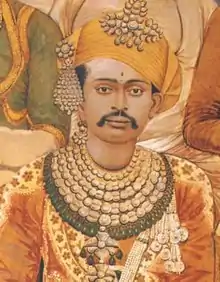Malhar Rao Gaekwad
Malhar Rao Gaekwad was the eleventh Maharaja of Baroda State reigning from 1870 to 1875. He was the sixth son of Sayaji Rao Gaekwad II and became Maharaja of Baroda after the death of his elder brother, Khanderao II Gaekwad.[1]
| Malhar Rao Gaekwad | |
|---|---|
| Maharaja of Baroda | |
 Malhar Rao Gaekwad | |
| 11th Maharaja of Baroda | |
| Reign | 1870 - 1875 |
| Predecessor | Khanderao II Gaekwad |
| Successor | Madhav Rao Thanjavurkar (de facto) Sayajirao Gaekwad III |
| Born | 1831 |
| Died | 1882 (aged 50–51) |
| House | Gaekwad |
| Father | Sayaji Rao Gaekwad II |
| Religion | Hinduism |
Reign
Malhar Rao spent money liberally, nearly emptying the Baroda coffers (he commissioned a pair of solid gold cannon and a carpet of pearls, among other expenses) and soon reports reached the Resident of Malharrao's gross tyranny and cruelty. Malharrao further attempted to cover up his deeds by poisoning the British Resident at Baroda, Robert Phayre, brother of Lieutenant General Arthur Purves Phayre with a compound of arsenic.[2] By order of the Secretary of State for India, Lord Salisbury, Malharrao was deposed on 10 April 1875 and exiled to Madras, where he died in obscurity in 1882.[1][3]
References
- Cahoon, Ben. "Indian Princely States A-J". www.worldstatesmen.org. Retrieved 1 April 2018.
- "Trial of the Guicowar of Baroda." South Australian Chronicle And Weekly Mail. XVII (869). South Australia. 10 April 1875. p. 3 (Supplement to the South Australian Chronicle and Mail). Retrieved 15 December 2018 – via National Library of Australia.
- Mulhar Rao Gaekwar Maharaja of Baroda, defendant (1875), The trial and deposition of Mulhar Rao Gaekwar of Baroda, Compiled and printed at the Bombay Gazette Steam Press, retrieved 15 December 2018